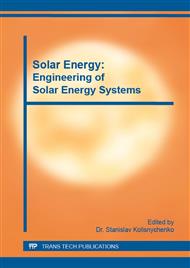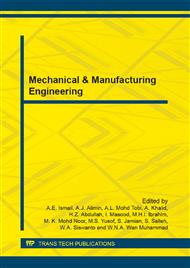p.309
p.315
p.320
p.325
p.330
p.334
p.339
p.344
p.349
Energy Savings and CO2 Reduction through Solar Water Heater Technology in Sindh Pakistan
Abstract:
Pakistan suffers worst energy crises due to unavailability of primary energy sources. One of the solutions to energy problems of Pakistan lies in utilization of renewable energy sources like solar energy. One of the possible uses of solar energy is in the form of water eating. This work explored the availability of solar energy in the Sindh province of Pakistan. Moreover potential fuel savings and reduction in CO2 emission due to the use of solar water heating system is also evaluated. The RETScreen software was used for evaluation of fuel savings and CO2 emission reduction from a solar water heating system. Results show that the annual natural gas supplied to an average household in the three main cities of Sindh i.e., Karachi, Hyderabad and Sukkur could be reduced by 513.5, 409 and 543.5 m3, respectively. Annual reductions in emissions of CO2 for Karachi, Hyderabad and Sukkur were estimated to be 1, 0.8 and 1 tCO2 respectively. It is concluded that the utilization of solar energy for water heating in domestic sector of Sindh Pakistan could save fuel fossil and reduce environmental pollutants that in-turn may help mitigate energy crises in the country.
Info:
Periodical:
Pages:
330-333
DOI:
Citation:
Online since:
April 2013
Authors:
Keywords:
Price:
Сopyright:
© 2013 Trans Tech Publications Ltd. All Rights Reserved
Share:
Citation:



